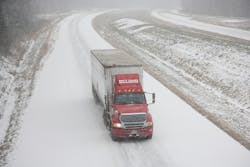A blast of subzero arctic air early this week – called a “polar vortex” by meteorologists – is expected to cause further road closures across many parts of the U.S, including the Midwest, Northeast, and even areas of the deep south, vastly increasing transportation difficulties for much of the country and affecting the bottom line of carriers across the nation.
In response to severe weather and expected extreme cold temperatures, Indiana Governor Mike Pence authorized all state government offices to remain closed today, with the state activating 24 Highway Assistance Teams with the Indiana National Guard, consisting of 96 individuals, to rescue stranded motorists and assist local emergency medical service (EMS) teams.
“We want to ensure that our employees are safe and that Hoosiers have access to critical public services,” Governor Pence said in a statement. “I am limiting the number of employees who must report to work on Monday to help keep people off the roads and out of the extreme cold, even while we make sure that Hoosiers have access to necessary government services.”
All lanes of Interstate 65 between Gary and Lafayette, IN, remain shut down as a of now due to hazardous road conditions, with Indiana State Police reporting that Interstate 80/94 is closed from mile marker 34 to the Illinois state line in northern Indiana and that U.S. 35 is shut down in Howard County from U.S. 31 to State Road 13 in Grant County.
Maryland’s State Highway Administration (SHA) is closely monitoring the same strong cold front now affecting the Midwest as it’s expected to freeze rainfall on roadways tonight and tomorrow within the Old Line State as well as for other areas up and down the East Coast.
“The greatest impact to motorists will be slick or even icy conditions on what appears to be just wet pavement – so staying alert and slowing down will be critical for your safety and others,” said Melinda Peters, SHA’s administration. “Crews are on the highways and will closely monitor conditions along with the Emergency Operations Center in Hanover.”
Dense fog is hampering visibility throughout much of Maryland with fog warnings in effect for many regions. High winds could also be a factor and instantly freeze moisture on trees and power wires, so SHA is urging motorists in Maryland to pay close attention to the road ahead and be prepared to alter routes and plans in the event of downed trees, large tree branches or wires.
While the impact on trucking and the U.S. freight transportation industry from the recent winter weather events will take time to calculate, a study released by the Allianz Global Corporate & Specialty insurance company late last year indicates that even mild changes in the weather can impact business performance across a wide range of industries.
“The weather does not have to be extreme in order to have a negative impact on cash flows; sometimes it is merely enough for it to be uncommon, unseasonal or even unexpected,” noted Karsten Berlage, global head of weather risk management at Allianz Risk Transfer (ART), one of Allianz’s specialty divisions.
The impact of routine weather variation on the U.S. economy could total as much as $534 billion a year, Allianz’s reported, entitled The Weather Business.
For example, the cost of weather-related delays in the U.S. for airlines and trucking companies annually amounts to $3 billion and $3.5 billion respectively and related costs are increasing significantly, with estimates indicating 30% of U.S. gross domestic product – some $5.7 trillion – is directly or indirectly affected by weather and climate activity.
During 2012, Allianz noted, there were 905 natural catastrophes worldwide, 93% of which were weather-related disasters, costing $170 billion. Yet the firm noted that insurers have paid out $70 billion globally for damages from extreme weather events every year for the last three years alone as compared to the 1980s, when “only” $15 billion a year was paid out for such claims.
“Some 70% of all companies are exposed to weather risk, yet many U.S. businesses are still failing to identify the link between climatic conditions and their own revenue stream,” Berlage noted in the report. “But the weather does not even have to be extreme in order to have a negative impact on a company’s cash flow. Sometimes it is enough for it to be uncommon, unseasonal or merely unexpected to generate a decline in revenue.”
He stressed that for many businesses just small changes in temperature, rainfall, sunshine, snowfall and wind levels can mean a large change in income.
“Yet however ‘bad’ the weather is, it is no longer a good excuse for volatile revenues, higher costs or disappointing earnings of a business,” Berlange pointed out. “While companies cannot be expected to control the weather, they are now expected to better control the risk of its financial impact.”
About the Author
Sean Kilcarr
Editor in Chief
Sean Kilcarr is a former longtime FleetOwner senior editor who wrote for the publication from 2000 to 2018. He served as editor-in-chief from 2017 to 2018.
